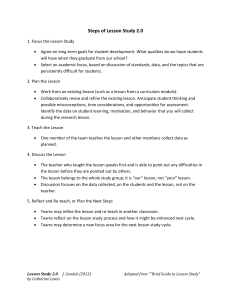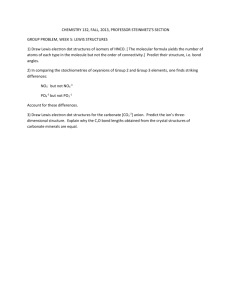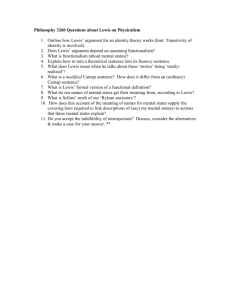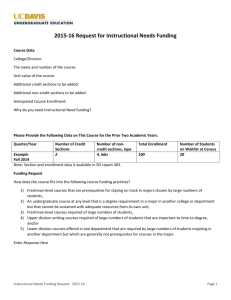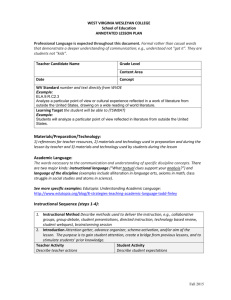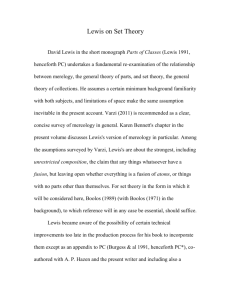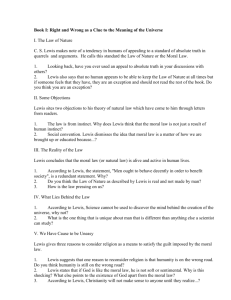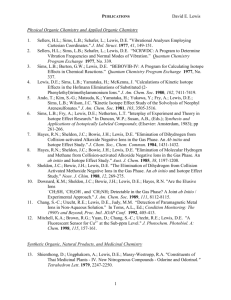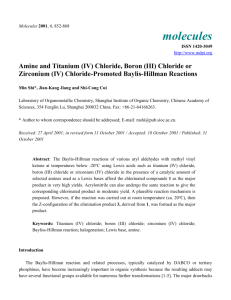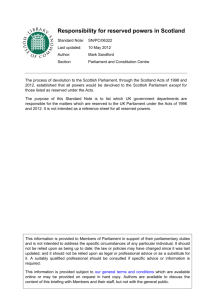Guide to Lesson Study
advertisement
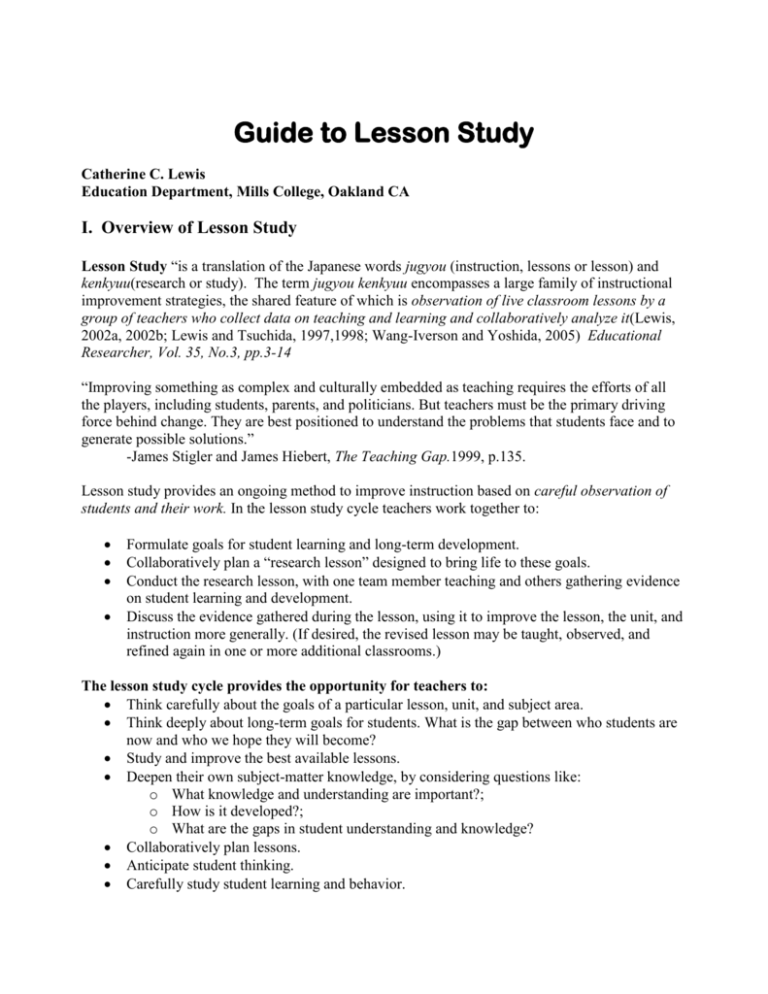
Guide to Lesson Study Catherine C. Lewis Education Department, Mills College, Oakland CA I. Overview of Lesson Study Lesson Study “is a translation of the Japanese words jugyou (instruction, lessons or lesson) and kenkyuu(research or study). The term jugyou kenkyuu encompasses a large family of instructional improvement strategies, the shared feature of which is observation of live classroom lessons by a group of teachers who collect data on teaching and learning and collaboratively analyze it(Lewis, 2002a, 2002b; Lewis and Tsuchida, 1997,1998; Wang-Iverson and Yoshida, 2005) Educational Researcher, Vol. 35, No.3, pp.3-14 “Improving something as complex and culturally embedded as teaching requires the efforts of all the players, including students, parents, and politicians. But teachers must be the primary driving force behind change. They are best positioned to understand the problems that students face and to generate possible solutions.” -James Stigler and James Hiebert, The Teaching Gap.1999, p.135. Lesson study provides an ongoing method to improve instruction based on careful observation of students and their work. In the lesson study cycle teachers work together to: Formulate goals for student learning and long-term development. Collaboratively plan a “research lesson” designed to bring life to these goals. Conduct the research lesson, with one team member teaching and others gathering evidence on student learning and development. Discuss the evidence gathered during the lesson, using it to improve the lesson, the unit, and instruction more generally. (If desired, the revised lesson may be taught, observed, and refined again in one or more additional classrooms.) The lesson study cycle provides the opportunity for teachers to: Think carefully about the goals of a particular lesson, unit, and subject area. Think deeply about long-term goals for students. What is the gap between who students are now and who we hope they will become? Study and improve the best available lessons. Deepen their own subject-matter knowledge, by considering questions like: o What knowledge and understanding are important?; o How is it developed?; o What are the gaps in student understanding and knowledge? Collaboratively plan lessons. Anticipate student thinking. Carefully study student learning and behavior. Build powerful instructional strategies – for example, develop questioning strategies that stimulate student interest and learning. II. Steps of Lesson Study 1. Focus the Lesson Study (1-4 hours) Agree on long-term goals for student development. What qualities do we hope students will have when they graduate from our school? Select an academic focus, based on discussion of standards and of the topics that are persistently difficult for students. 2. Plan the Research Lesson (4-8 hours) Study existing lessons. Building on the best available lessons, map out a unit that brings to life long-term goals for student development, and that will move students from their current understanding/knowledge to the place we’d like them to be. Plan in detail one “research lesson” in that unit. As part of the planning, try out the lesson as adults and anticipate student thinking. Identify the data on student learning, motivation, and behavior that you will collect during the research lesson. 3. Teach and Discuss the Research Lesson (1 lesson, followed by discussion same day or soon after) One member teaches the lesson and other team members collect data as planned Conduct a post-lesson discussion. Structure the discussion agenda and consider the following conventions: o The teacher who taught the lesson speaks first and has the chance to point out any difficulties in the lesson before they can be pointed out by others. o (Teachers need not criticize something that’s already been pointed out as and issue.) o The lesson belongs to the whole study group; it is “our” lesson, not “your” lesson. o Discussion focuses on the data collected at the research lesson—on the students and lesson, not the teacher 4. Reflect and Re-teach, Or Plan the Next Step (1-5 hours) Would you like to refine and re-teach the lesson in another classroom? What should be changed? What went well in your lesson study effort, and what would you like to change next time around? What new issues or problems came up that you would like to address in your next research lesson cycle? III. Supports for Lesson Study See the lesson as part of the unit o map out the overall goals and “flow” of the unit o don’t try to cram too much into one lesson Value self-criticism o a key belief is that lessons (however wonderful) can always be improved o create a climate that encourages self-criticism Embrace mistakes o much can be learned from imperfect lessons o the yardstick for measuring lesson study’s worth is how much teachers learned along the way o lesson study is not a quick fix, but a slow, steady means of instructional improvement o remember you are pioneers—mistakes are to be expected, and many other teachers will be eager to learn from you Don’t worship originality o what’s important is whether the lesson promotes student learning, not whether it is original Develop group norms o talk about what will make your group productive and supportive o formulate ground-rules, and revisit them at each meeting IV. Four Levels of Lesson Study Goals: Lesson study focuses simultaneously on four levels of goals. Examples are included below: Level 1: Goals Specific to the Lesson Be motivated to find out the principles of levers in subsequent lessons. Identify businesses and institutions in the neighborhood of the school Discover that the circumference of a circle is always about three times its diameter Level 2: Goals Specific to the Unit Understand that the force needed to lift an object of constant weight with a lever changes, depending on position of object and force Develop an awareness of the local community and one’s role in it. Understand how to calculate the area of a circle, and how the area of a circle relates to the area of a rectangle. Level 3: Broad Subject-Matter Goals Actively use prior knowledge to solve novel mathematics problems Develop scientific habits of mind such as use of the five senses, use of evidence to warrant assertions, and use of controlled investigation. Level 4: Long-term Goals for Student Development Take initiative as learners Learn with desire Value friendship Work cooperatively with others V. Questions To Consider When Planning the Research Lesson Planning a research lesson differs from the lesson planning familiar to most of us. The following basic questions guide planning of a research lesson. 1. What do students currently understand about this topic? 2. What do we want them to understand at the end of the lesson (and unit)? 3. What's the “drama” or sequence of experiences that will propel students from 1 to 2? 4. What kinds of student thinking (including problems and misconceptions) do we anticipate in response to each element of the lesson? How will we use these to foster movement from what students currently understand to what we want them to understand? 5. What will make this lesson motivating and meaningful to students? 6. What evidence from the lesson will help us reflect on our goals for learning and student development? For example, what data should we collect regarding student learning, motivation, and behavior, what forms are needed to collect it, and who will be responsible for each piece? VI. Examples of Data Collected During Research Lessons Academic Learning How did students’ images of heated air change after the experiment? Did students shift from simple counting to more flexible method? Did dramatic role-play spark higher quality and quantity of writing? What did students learn about area, as expressed in their notes? Motivation Percent of children who raised hands Body language, “aha” comments, shining eyes Social Behavior How many times do students refer to and build on classmates’ comments? Are students friendly and respectful? How often do 5 quietist children speak up? Student Attitudes toward Lesson What did you like and dislike about the lesson? What would you change the next time it is taught? How did it compare with your usual lessons in_____? Excerpted from Catherine Lewis, “Lesson Study: A Handbook for Teacher-Led Improvement of Instruction,” Philadelphia: Research for Better Schools, 2002. Permission granted for single-copy use.

